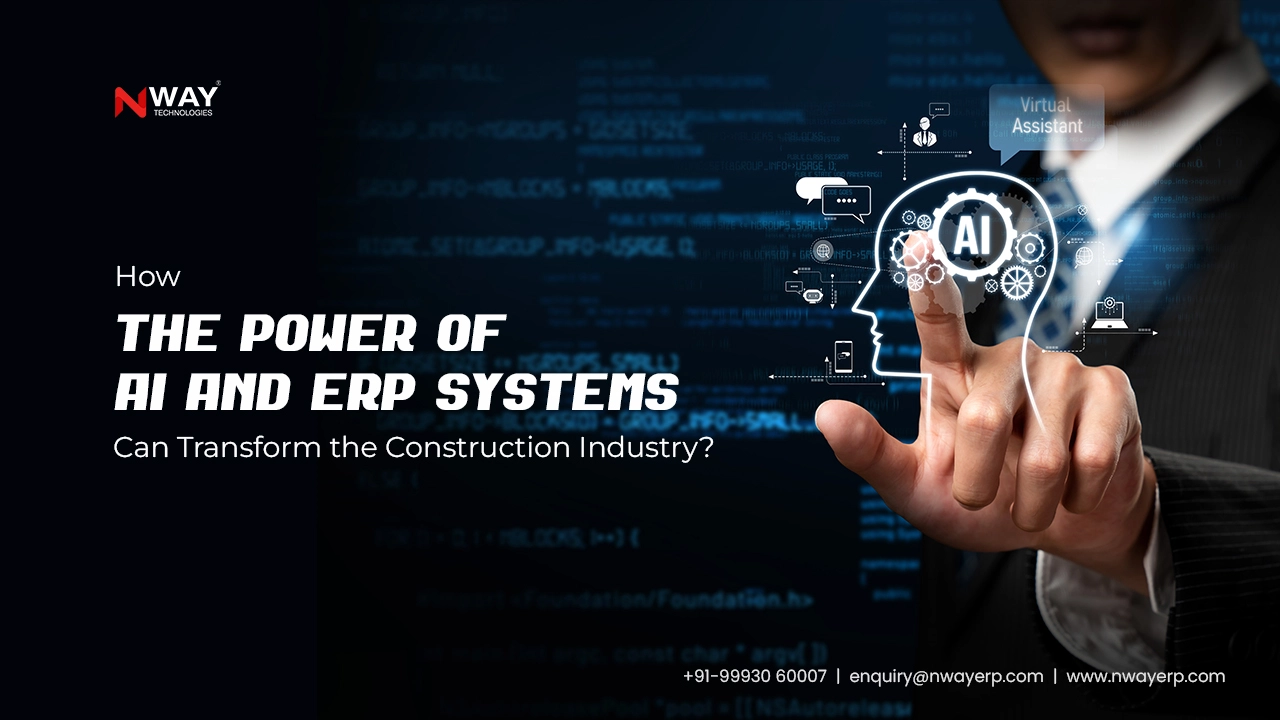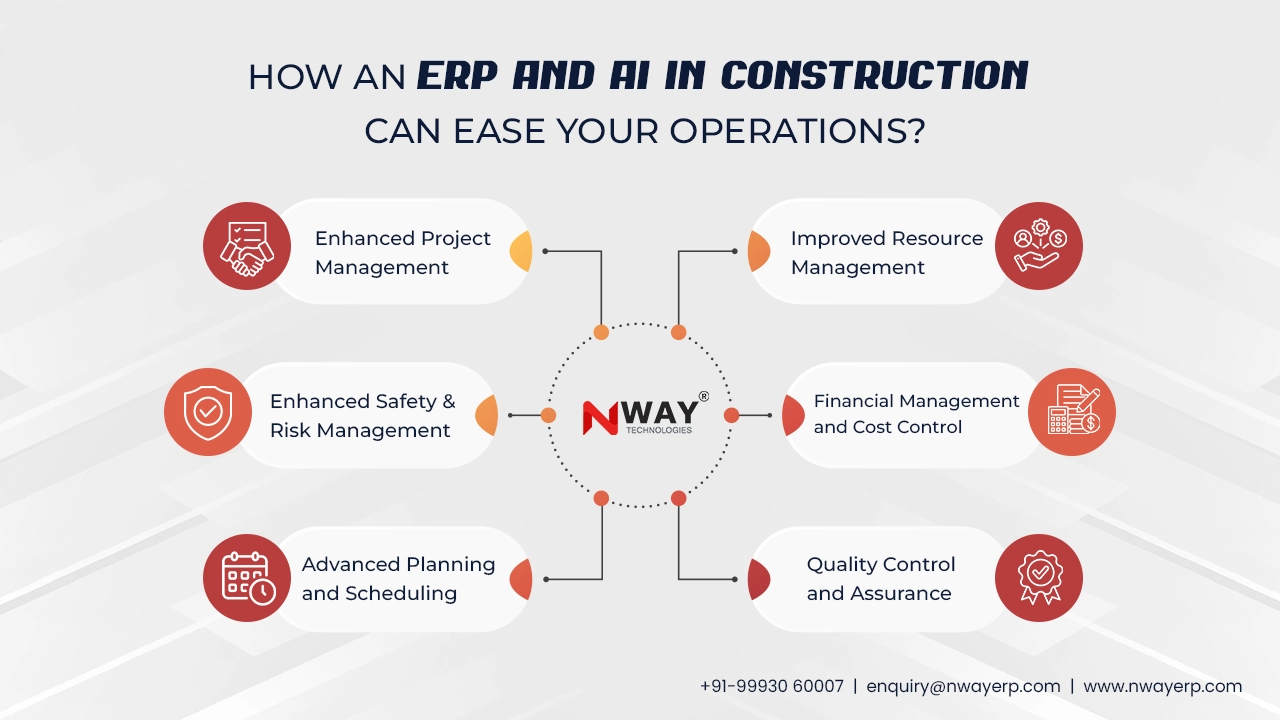In the world of technological advancement and digital transformation, the construction industry is also on boom. Various construction companies around the world are opting for Artificial Intelligence. Its power is no longer hidden from anyone around the corner.
Artificial Intelligence in the construction industry with Enterprise Resource Planning (ERP) systems is changing the dynamics of construction projects exponentially. From improving efficiency to reducing extra costs and enhancing safety, AI-driven ERP systems are a complete set to transform the construction industry.
Let’s take a detailed overview of how this powerful combination can benefit the construction industry.
Enhanced Project Management
Predictive Project Management
Various AI algorithms in combination with an ERP system can help in analyzing vast amounts of data to predict future project outcomes. These capabilities can help in making informed decisions, managing potential issues, and adjusting plans to remain on track and within budget.
It can help forecast project delays based on weather patterns, labor availability, and supply chain disruptions, allowing managers to proactively mitigate these risks.
Real-Time Monitoring and Reporting
Construction AI with an effective ERP system can help companies enable real-time monitoring of construction activities. Managers can track progress, resource utilization, and project milestones using a centralized dashboard, facilitating timely interventions and adjustments. This centralized dashboard provides visibility and deviations from the plan immediately along with identifying and addressing minor issues from escalating into severe problems.
Improved Resource Management
Optimized Allocation of Resources
Advanced ERP systems can help optimize the allocation of resources such as labor, machinery, and materials. It also analyzes patterns and project requirements, it also ensures that resources are utilized efficiently, reducing waste and lowering costs.
Automated Inventory Management
Inventory management is crucial in construction. An ERP system can provide estimated material requirements based on project timelines and consumption patterns. It will help in arranging the right materials at the right time and minimizing delays and excess inventory. It also automates tracking and reordering processes, along with reducing the risk of stockouts and overstocking, leading to cost savings and smoother project execution.
Streamlined Purchase Management
Modern and technologically updated ERP Systems and AI can significantly enhance purchase management in the construction company. It can also analyze historical purchasing data, supplier performance, and market trends. This allows construction companies to negotiate better terms with suppliers, optimize procurement schedules, and reduce costs. Using AI, it is easier to predict future purchasing needs based on project timelines and consumption patterns, it also avoids delays due to material shortages.
Enhanced Safety and Risk Management
Predictive Maintenance of Equipment
ERP with a proactive AI approach can help you manage and forecast the machinery and equipment management. It also allows timely maintenance, preventing unexpected breakdowns along with the acknowledgments about smooth progress and cost delays. By analyzing sensor data and historical maintenance records, an ERP can notify you of maintenance due dates, and optimal time for servicing equipment, and balance the cost of maintenance with the risk of failure.
Enhanced Safety Timing
A good ERP system can provide you with training programs to manage effective and safe construction processes. It also helps analyze individual worker behavior and reports to identify areas where additional training is required.
Financial Management and Cost Control
Accurate Cost Estimation
Effective cost estimation is one of the most important concerns in construction businesses, it is necessary to accurately estimate the cost by analyzing historical data and considering related factors such as labor rates, material costs, and project complexity. A good ERP system can provide you with more reliable budgets and financial planning leveraging accurate cost estimation.
Accurate Financial Reporting
A good ERP system with efficient construction AI capabilities can help in smoothening financial reporting, it also reduces the time and effort required for manual data entry and analysis. It makes efficient P & L management along with managing debit and credit notes. It identifies anomalies in financial statements removing discrepancies and allowing prompt corrective action.
Cash Flow Management
AI in construction companies with a combination of ERP can manage cash flow more effectively by predicting future cash flows. It manages project schedules, payment terms, and historical payment patterns. By anticipating cash flow shortages, proactive measures can be taken to ensure financial stability. It will also lead to negotiating better payment terms and securing short-term financing.
Advanced Planning and Scheduling
Optimized Project Scheduling
Managing multiple projects simultaneously at different locations requires huge manpower and constant focus. With an AI-driven ERP solution, it is easier to optimize project schedules considering multiple options like resource availability, weather conditions, and project dependencies. It also provides realistic timelines and use of resources. By analyzing project data, it provides adjusted schedules in real-time to accommodate changes and delays in material delivery, and unexpected site conditions, ensuring that projects stay on track
Scenario Analysis
ERP systems with AI-powered systems can simulate different scenarios to assess the impact of changes in project plans. This allows project managers to evaluate other options and choose the best course of action, reducing risks and uncertainties.
Resource Leveling
AI can perform resource leveling, which involves adjusting the start and finish dates of tasks to ensure that resource demand does not exceed resource availability. It will also help prevent overallocation and the resources are used efficiently throughout the entire project lifespan.
Quality Control and Assurance
Effective Quality Inspections
An effective ERP system can help streamline quality inspections by using image recognition and other technologies along with identifying defects and deviations from standards. This also ensures that construction work meets quality requirements, reducing rework and improving quality.
Data-Driven Quality Management
A robust ERP system can analyze data from different sources, it can provide insights into common quality issues and their root causes. This information helps construction companies in implementing quality management practices targeting improved processes positively.
Continuous Improvement
A robust and feature-rich ERP system facilitates continuous improvement in the construction company taking into account the real-time feedback at each site, location, and project. It also analyzes data from sensors and other sources identifying areas for improvement and suggesting corrective actions. It helps in meeting quality standards at any construction site.
Conclusion
The integration of ERP systems with AI in construction is transforming the way construction companies operate their operations along with giving a clear path to growth and success. It is also helping companies enhance their project management and resource allocation to improve safety, communication, and financial performance.
With this system, the construction industry can get a power pack set enabling better decision-making, enhanced safety, better budget control, accurate planning, and superior quality assurance
So, it is high time for construction companies to opt for a robust ERP system that integrates with AI in construction. It will provide greater precision to move further managing smooth operations at every site or location.
You can learn more about how an ERP system can transform your construction parameters, by having an expert-led interaction with NWAY ERP. It is specially designed software to meet the construction industry’s needs, providing a smooth platform for the operation of their day-to-day operations for road construction, infrastructure, ready-mix concrete, pipelines, mines & quarries, and more. Request a demo now!




